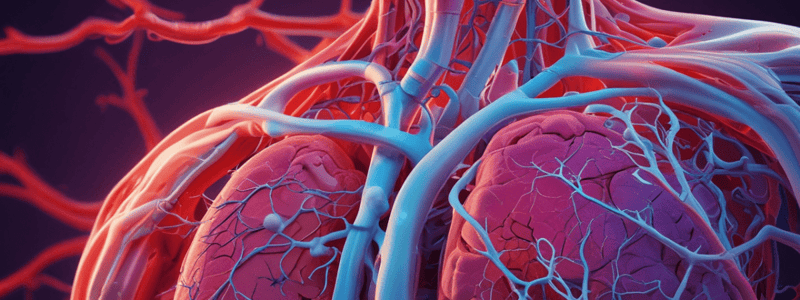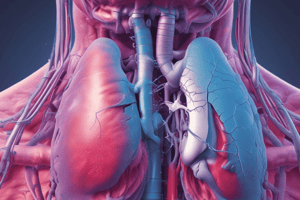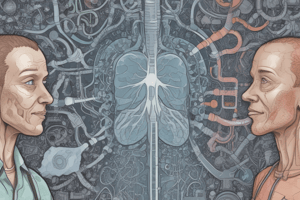Podcast
Questions and Answers
What term is used to describe breathing that is either too slow or too shallow to meet the body's metabolic needs?
What term is used to describe breathing that is either too slow or too shallow to meet the body's metabolic needs?
- Hyperpnea
- Bradypnea (correct)
- Hyperventilation
- Tachypnea
Which of the following conditions may interfere with pulmonary gas exchange leading to hypoventilation?
Which of the following conditions may interfere with pulmonary gas exchange leading to hypoventilation?
- Oxygen-rich environment
- Regular physical exercise
- Obesity (correct)
- Asthma
What is the term for a decrease in oxygen levels in the blood, resulting from lower amounts of oxygen diffusing into the blood?
What is the term for a decrease in oxygen levels in the blood, resulting from lower amounts of oxygen diffusing into the blood?
- Hypoxemia (correct)
- Hyperoxia
- Hypercapnia
- Hypocapnia
What happens to blood Pco2 levels during hypoventilation?
What happens to blood Pco2 levels during hypoventilation?
Insufficient oxygen delivery to systemic cells due to low blood oxygen levels may result in a decrease in what process?
Insufficient oxygen delivery to systemic cells due to low blood oxygen levels may result in a decrease in what process?
What happens to pH levels when there is a high blood Pco2 due to hypoventilation?
What happens to pH levels when there is a high blood Pco2 due to hypoventilation?
What happens to Po2 levels in the alveoli during hyperventilation?
What happens to Po2 levels in the alveoli during hyperventilation?
Which of the following is a consequence of the increased Pco2 gradient during hyperventilation?
Which of the following is a consequence of the increased Pco2 gradient during hyperventilation?
What is the condition called when arterial blood Pco2 decreases below normal levels?
What is the condition called when arterial blood Pco2 decreases below normal levels?
What is one effect of low arterial blood Pco2 on systemic blood vessels?
What is one effect of low arterial blood Pco2 on systemic blood vessels?
Which of the following is an ironic result of hyperventilation?
Which of the following is an ironic result of hyperventilation?
What condition may result if the body's buffering capacity is exceeded during hyperventilation?
What condition may result if the body's buffering capacity is exceeded during hyperventilation?
What is the primary cause of respiratory acidosis?
What is the primary cause of respiratory acidosis?
Which of the following is NOT a symptom of insufficient blood Po2 or increased blood Pco2?
Which of the following is NOT a symptom of insufficient blood Po2 or increased blood Pco2?
What happens if hypoventilation is prolonged?
What happens if hypoventilation is prolonged?
How does blood Pco2 change if an individual is hyperventilating?
How does blood Pco2 change if an individual is hyperventilating?
What happens to oxygen delivery to the brain during hypoventilation?
What happens to oxygen delivery to the brain during hypoventilation?
What happens when the accumulation of CO2 in the blood stimulates chemoreceptors?
What happens when the accumulation of CO2 in the blood stimulates chemoreceptors?
What is the rhythmic pressure change during breathing referred to as?
What is the rhythmic pressure change during breathing referred to as?
How does hyperventilation affect venous return of blood and lymph?
How does hyperventilation affect venous return of blood and lymph?
What is the primary difference between hyperpnea and hyperventilation?
What is the primary difference between hyperpnea and hyperventilation?
During vigorous exercise, what happens to a person's breathing depth and rate?
During vigorous exercise, what happens to a person's breathing depth and rate?
How are oxygen consumption and carbon dioxide production affected during exercise?
How are oxygen consumption and carbon dioxide production affected during exercise?
What happens to blood $Po_2$ and $Pco_2$ levels during exercise?
What happens to blood $Po_2$ and $Pco_2$ levels during exercise?
What happens to breathing, cardiac output, and blood flow during exercise?
What happens to breathing, cardiac output, and blood flow during exercise?
What is the primary reason for the changes in breathing during exercise?
What is the primary reason for the changes in breathing during exercise?
How do blood Po2 and Pco2 levels change during exercise?
How do blood Po2 and Pco2 levels change during exercise?
What effect does exercise have on venous return of blood and lymph?
What effect does exercise have on venous return of blood and lymph?
If exercise increases venous return of blood, how would it affect heart rate?
If exercise increases venous return of blood, how would it affect heart rate?
Which of the following is NOT listed as a possible reason for the change in breathing during exercise?
Which of the following is NOT listed as a possible reason for the change in breathing during exercise?
What is the primary effect of low arterial blood Pco2 on systemic blood vessels?
What is the primary effect of low arterial blood Pco2 on systemic blood vessels?
What condition is described when arterial blood Pco2 decreases below normal levels?
What condition is described when arterial blood Pco2 decreases below normal levels?
What is an ironic result of hyperventilation?
What is an ironic result of hyperventilation?
What is the effect of low blood Pco2 on blood pH?
What is the effect of low blood Pco2 on blood pH?
Which of the following is a symptom that may accompany hyperventilation?
Which of the following is a symptom that may accompany hyperventilation?
What is the purpose of directing a person who is hyperventilating to breathe into a paper bag?
What is the purpose of directing a person who is hyperventilating to breathe into a paper bag?
What is the primary reason for the changes in breathing during exercise?
What is the primary reason for the changes in breathing during exercise?
What is the primary effect of hyperventilation on the chemical composition of blood?
What is the primary effect of hyperventilation on the chemical composition of blood?
How does hyperventilation affect venous return of blood and lymph?
How does hyperventilation affect venous return of blood and lymph?
How do blood $Po_2$ and $Pco_2$ change during exercise?
How do blood $Po_2$ and $Pco_2$ change during exercise?
What is the primary reason for the changes in breathing rate and depth during exercise?
What is the primary reason for the changes in breathing rate and depth during exercise?
If exercise increases venous return of blood, how would it affect heart rate?
If exercise increases venous return of blood, how would it affect heart rate?
During vigorous exercise, what happens to a person's breathing depth and rate?
During vigorous exercise, what happens to a person's breathing depth and rate?
What is the primary cause of respiratory acidosis?
What is the primary cause of respiratory acidosis?
What is the primary difference between hyperpnea and hyperventilation?
What is the primary difference between hyperpnea and hyperventilation?
What is the term used to describe breathing that is either too slow or too shallow to meet the body's metabolic needs?
What is the term used to describe breathing that is either too slow or too shallow to meet the body's metabolic needs?
What is the primary difference between hyperpnea and hyperventilation?
What is the primary difference between hyperpnea and hyperventilation?
What happens when the accumulation of CO$_2$ in the blood stimulates chemoreceptors?
What happens when the accumulation of CO$_2$ in the blood stimulates chemoreceptors?
What symptoms may result from insufficient blood Po2 or increased blood Pco2?
What symptoms may result from insufficient blood Po2 or increased blood Pco2?
What is the consequence of low oxygen saturation of hemoglobin in tissues?
What is the consequence of low oxygen saturation of hemoglobin in tissues?
What is the outcome of voluntary hypoventilation or cessation of breathing?
What is the outcome of voluntary hypoventilation or cessation of breathing?
What stimulates chemoreceptors in response to the accumulation of CO2 in the blood?
What stimulates chemoreceptors in response to the accumulation of CO2 in the blood?
What prompts the initiation of inspiration during hypoventilation before the brain suffers from lack of oxygen?
What prompts the initiation of inspiration during hypoventilation before the brain suffers from lack of oxygen?
How does hypoventilation influence the blood’s pH levels?
How does hypoventilation influence the blood’s pH levels?
What is the term for breathing that is deeper, but not faster, during vigorous exercise?
What is the term for breathing that is deeper, but not faster, during vigorous exercise?
How do blood Po2 and Pco2 levels typically remain during exercise?
How do blood Po2 and Pco2 levels typically remain during exercise?
Which process increases during hyperventilation, aiding in the increased return of blood and lymph?
Which process increases during hyperventilation, aiding in the increased return of blood and lymph?
What is the primary difference between hyperpnea and hyperventilation during increased breathing?
What is the primary difference between hyperpnea and hyperventilation during increased breathing?
What occurs to venous return of blood and lymph during hypoventilation?
What occurs to venous return of blood and lymph during hypoventilation?
What does hyperpnea differ from hyperventilation in terms of body's demands?
What does hyperpnea differ from hyperventilation in terms of body's demands?
Flashcards are hidden until you start studying




